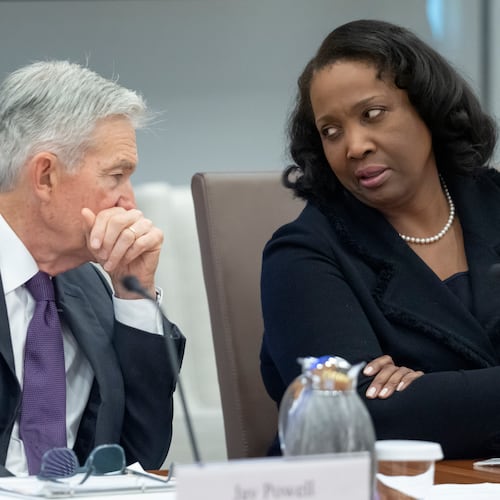By the time she was 45 years old, Dorothy Bolden had been a domestic worker for 36 years.
She began at 9 years old, washing dirty diapers for her mother’s employer. Bolden’s mother was a housekeeper, so the idea of her daughter cleaning up after white people was perhaps not welcome, but not unfamiliar. Domestic labor was the lot of many black women from Reconstruction until the 1960s, a career born of the limits of segregation.
RELATED: Read AJC Sepia’s full Black History Month Series
After decades of working in luxurious Atlanta homes she’d never be able to afford, fending off the advances of male employers, and caring for other people’s children out of financial necessity but at the expense of time spent with her own, Dorothy Bolden decided it was time to serve notice, not just for herself, but for thousands of domestics like her.
“Our skill was thought to be the lowest and our mind, the smallest,” Bolden wrote in a manual for domestic workers. “These two particular things made us frustrated, hopeless, and most of all shameful. We were overlooked completely … We are highly discriminated against. We’re thought to be ignorant and irresponsible, but little do they know that we are well educated in household chores.”
Bolden’s statement was a declaration for the dignity of domestic labor and the black women who performed it. The disrespect, low wages and relative invisibility experienced by housekeepers led her to write those words after she founded the National Domestic Workers’ Union of America in 1968 in Atlanta.
She wasn't the first black woman to try to organize the city's domestic workers. African-American laundry workers went on strike in 1881. But Bolden was the most successful organizer. Over nearly three decades, the NDWUA recruited more than 13,000 workers in 10 cities. Its goals were modest but nonetheless ambitious: to raise the pay of domestic workers — which typically could be as little as $3.50 a day — and fight for benefits, paid sick time, better working conditions and basic respect.
Bolden often gave credit to the Rev. Martin Luther King Jr., who lived in her Vine City neighborhood, for encouraging her to organize domestic workers. But it was she who rode city buses identifying women who were housekeepers and she who recruited them to her nascent movement. She knew the job they did was hard and often thankless.
“We was locked into a system that we didn’t create, but they (white people) created,” Bolden said in a 1978 interview, referring to the economic disenfranchisement black workers faced as a result of segregation. “We was helping them to create their money. We was saving them. They was living in luxury. We wasn’t.”
As a part of the union, Bolden came up with a code of conduct manual not just for members but for employers. In addition to addressing overtime, Social Security benefits and working hours, the manual was clear on the kinds of work a maid should not be asked to do. Apart from rules that addressed a maid’s safety, such as not being asked to climb high ladders to wash windows, other mandates spoke to housekeepers’ self-worth. “Household workers do not: scrub floors on knees.” It was a physical position of subservience Bolden thought no woman should assume while cleaning any home but her own.
Premilla Nadasen is a history professor at Columbia University and author of “Household Workers Unite: The Untold Story of African American Women Who Built a Movement.” It tells the story of Bolden and other women who took up the fight for domestic workers’ rights.
“They either always took pride in their work or they overcame the shame and began to value their work,” Nadasen wrote in an email interview. “They were an atypical group, however, since they were organizers and activists. One strategy to push back on the stigma was the training and professionalism programs that sought to elevate the labor.”
While the NDWUA didn’t have training programs, it did have one requirement. Any woman who wanted to join and use the organization’s job referral list had to register to vote.
“I don’t want to be out here pushing for you and you not registered to vote,” she told The Atlanta Journal-Constitution in 1986. “We aren’t Aunt Jemima women, and I sure to God don’t want people to think we are. We are politically strong and independent.”
RELATED: The Atlanta Laundry Workers’ Strike of 1881
RELATED: Fannie Lou Hamer: ‘Sick and tired’ sharecropper became political force
RELATED: Faye Wattleton: Champion for women’s rights and health care
As she gathered a constituency, she also built political clout. When the first legislation to authorize a multicounty rail system came up for a vote, Bolden was against it. Not because she didn’t like the idea of MARTA, Atlanta’s mass transit system, but because the MARTA rail plan was developed without African-American participation. It also wasn’t going to fully service communities with large black populations. She helped lead the charge that ultimately defeated the 1968 measure.
Presidents Richard Nixon, Gerald Ford and Jimmy Carter sought her as an adviser.
But Bolden’s concern for domestic workers did not waver. She came up with the idea of Maid’s Honor Day, an annual event first recognized through proclamation in 1970 by then-Atlanta Mayor Sam Massell and later by the state by then-Gov. Jimmy Carter. Each year, Bolden made the Honor Day luncheon a high affair, soliciting advertisements and sponsorships for the banquet from local businesses from Rich’s Department Stores to Coca-Cola. Hundreds attended each year. It was a chance for women accustomed to invisibility and isolation in their workplaces to be seen and honored.
“It takes a special kind of person to do this and the household worker is special,” Bolden wrote in the NDWUA manual. “Treat her with much respect and give her dignity. You may be her one day.”
BLACK HISTORY MONTH
Throughout February, we’ll spotlight a different African-American pioneer in the daily Living section Mondays through Thursdays and Saturdays, and in the Metro section on Fridays and Sundays. Go to ajc.com/news/martin-luther-king-jr for more subscriber exclusives on people, places and organizations that have changed the world, and to see videos on the African-American pioneer featured here each day.
About the Author
Keep Reading
The Latest
Featured





